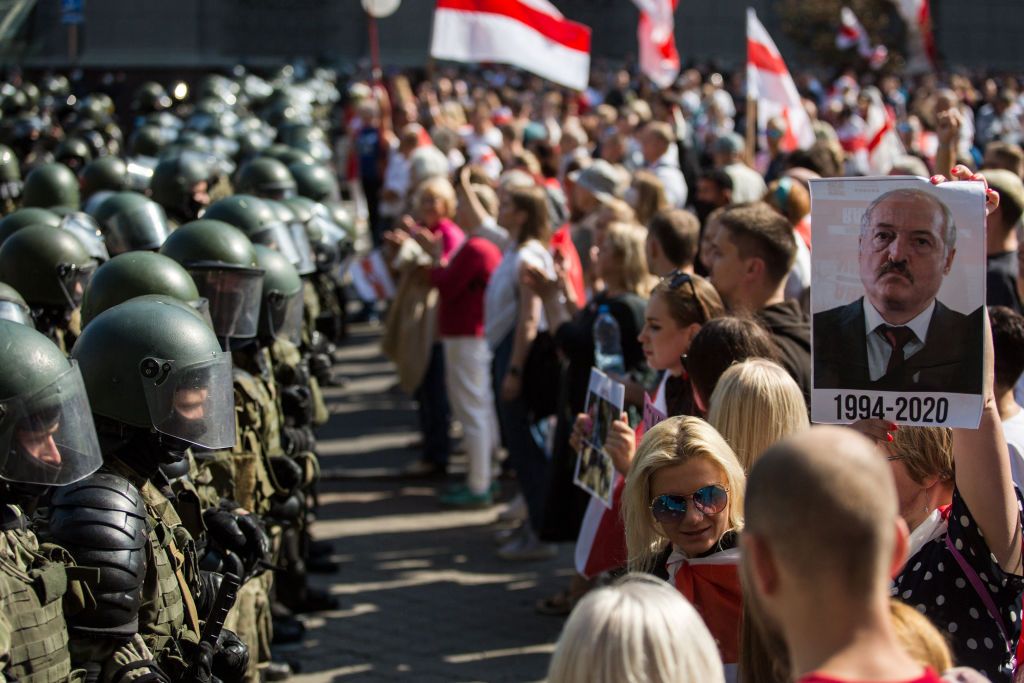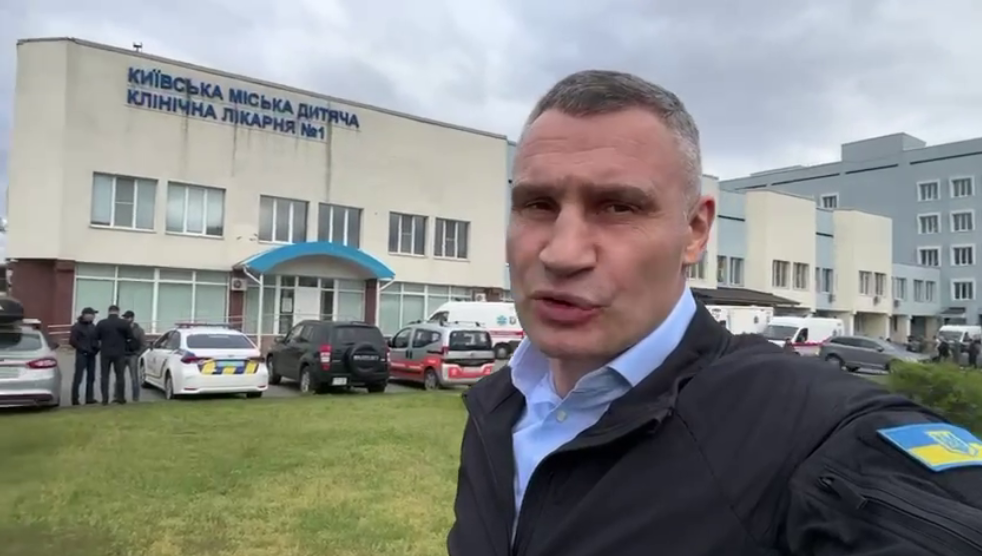
Belarusian hackers claim to have infiltrated KGB computer network
Table of Contents
Belarusian dictator Alexander Lukashenko becomes chairman of the All-Belarus People’s Assembly, a newly established extra-governmental body.
Two hospitals in Kyiv were evacuated following threats from the head of the Belarusian KGB.
Lithuania demands Minsk retract claims it was preparing for drone attacks on Belarusian targets.
Subscribe to the Newsletter
Belarus Weekly
The Belarusian service of German media outlet Deutsche Welle is declared an extremist organization and banned in Belarus.
The Belarusian Cyber Partisans group claims to have hacked KGB servers, accessing 40,000 denunciation reports and 8,600 agent profiles.
The Norwegian government pledges $900,000 to the political prisoners fund set up by Belarusian opposition leader Sviatlana Tsikhanouskaya.
New Belarusian extra-governmental body holds first meeting, appoints Lukashenko its chairman
The new Belarusian extra-governmental body, the All-Belarus People’s Assembly, convened on April 24-25 in Minsk, appointing long-time Belarusian dictator Alexander Lukashenko as its chairman, approving the country’s military doctrine, and causing an international scandal with drone attack allegations.
Lukashenko initiated the assembly at a contested referendum on Feb. 27, 2022. The body is not a member of any of the country’s other branches of power, but claims supremacy over all of them. The new institution was initially designed as a refuge for Lukashenko should he leave the presidency, but now it is increasingly viewed as a “decor” for his regime – presenting the illusion of distribution of power, while Lukashenko remains in sole control as the country’s dictator.
It was thus no surprise that the assembly duly elected Lukashenko as its chairperson, awarding him a post with the second-highest profile in the country, after the one he already has.
Opinion: Russia’s war may have opened Pandora’s box for Belarus
As Russia’s full-scale war against Ukraine rages on, the stability of neighboring Belarus, which has been backing Russia’s aggression, appears to be fracturing. Has Russian President Vladimir Putin’s war of aggression opened a Pandora’s box for a regime that is practically a remote wing of the Kreml…

Described as a powerful organization capable of considering the legitimacy of elections, impeaching the president, and declaring an emergency and state of war, the assembly is, in fact, a conference that Belarusian political analysts compared to the Soviet Communist Party Central Committee designed to imitate popular approval and participation.
Analysts believe that similarly to its Soviet predecessor, the body of 1,200 mid-level officials, which only convenes once a year for a couple of days and therefore can’t govern the country on a constant basis, will essentially be mostly idle.
The main speaker of the congress, Lukashenko, reiterated the propaganda line that Belarus is being dragged into a war by its Western neighbors, and is being threatened by the exiled opposition.
The meeting culminated in a speech by the chief of the notorious Belarusian KGB, Ivan Tertel, who sparked an international scandal by claiming Belarus had thwarted a drone attack from Lithuania. He also accused Ukraine of hiding Belarusian “terrorists” in civilian hospitals, giving their exact locations and promising attacks.
Two hospitals evacuated in Kyiv following Tertel's threats
The Kyiv City Administration evacuated two hospitals on Bohatyrska Street on April 26 after Belarusian security chief, Ivan Tertel, alleged they were harboring “terrorists,” sparking fear of airstrikes.
The evacuation of two civilian hospitals, including one for children, was necessitated by the circulation of an unspecified video online “announcing an enemy attack on these medical institutions,” city authorities said.
“The (enemy) is trying to use it as an excuse to strike the social infrastructure of the capital,” the Kyiv City Administration said.
Speaking on April 25, Belarusian KGB chairman Ivan Tertel accused Ukraine of providing shelter in hospitals to “extreme radicals,” referring to Belarusian volunteers fighting alongside Ukrainian forces against Russia.
Kyiv evacuates children hospital due to attack threat
Kyiv authorities urgently evacuated two hospitals on April 26 after a Belarusian official appeared to threaten them with attack in a speech.

Tertel said hospitals at 30 and 32 Bohatyrska Street were the hideouts of the alleged terrorists, and he threatened to take decisive action “according to the laws of wartime, resolutely and without hesitation.”
Ukraine’s SBU security service said the claims were a “psychological operation” orchestrated to bolster Russian interests.
“Any statements by representatives of the Belarusian authorities regarding mythical terrorists who are allegedly in Ukrainian hospitals should be seen as a manifestation of information and psychological special operations that play into the hands of Russia,” reads an official statement by Ukraine’s Security Service.
While not sending Belarusian troops to fight in Ukraine, Belarusian dictator Alexander Lukashenko has provided the Russian army with weapons and logistics support, and has echoed Russia’s propaganda narratives.
Lithuania demands Belarus retract allegations it prepared drone attacks
The Lithuanian Foreign Ministry has demanded that Belarus retract allegations made by Tertel regarding the military drone attack from Lithuania allegedly thwarted by the Belarusian KGB.
On April 26, Belarus’ chargé d’affaires ad interim, Yaroslav Khmyl, received a diplomatic note expressing strong protest from Lithuania against what it said were unsubstantiated insinuations.

Speaking at the All-Belarus People’s Assembly on April 25, Tertel claimed that Belarus had prevented an attempted drone attack from Lithuania. The security chief also accused paramilitary organizations of Belarusians abroad of preparing terrorist attacks in Belarusian regions adjacent to Lithuania, and claimed the security services had thwarted these alleged plans.
The Lithuanian authorities dismissed the claim as “disinformation” and “nonsense.” Lithuania’s Defense Ministry claimed the statement by the Belarusian security chief was “a classic case of disinformation that has nothing to do with reality.”
Interior Ministry slaps 'extremist' label on Deutsche Welle journalists in Belarus
The journalists of DW Belarus, the Belarusian service of Germany’s state-funded newscaster Deutsche Welle, have been declared an “extremist formation” and have been banned from operating within the country following a decision of the Belarusian Interior Ministry of April 29.
The decision declares DW Belarus’ content across all platforms to be “extremist” and bans the use of its logo. Working for the outlet is now considered “participating in an extremist formation,” which is punishable by seven years of imprisonment.
This decision severely restricts the media outlet’s access to its audience, and threatens anyone sharing information or giving interviews to DW journalists with prosecution. Anyone subscribing to DW Belarus, or spreading, liking, and commenting on its content could face administrative arrest and fines.
The German Foreign Ministry described the move as attempted intimidation.
“The rulers in Minsk are trying with all their might to intimidate and silence journalists and the media,” reads an official statement by DW Belarus on X, formerly known as Twitter.
DW General Director Peter Limbourg rejected the allegations and criticized the decision.
Following anti-government protests in 2020, the Lukashenko’s regime weaponized anti-extremist legislation against the media and activists. Nearly 200 media outlets and 3,000 individuals have already been labeled as extremists, and the lists continue to grow.
Lithuania’s FM: Russian GPS jamming of commercial flights ‘too dangerous to ignore’
Baltic foreign ministers have warned that the suspected Russian jamming of GPS systems aboard commercial flights is “too dangerous to ignore.” This comes after it was revealed that two Finnish aircraft were forced to turn around mid-journey in recent days.

Belarusian hackers claim to have infiltrated KGB computer network
Belarusian Cyber Partisans, a hacker group that emerged in the wake of 2020 anti-government protests in Belarus, announced on April 26 that it had broken into the Belarusian KGB’s computer network.
According to the group, hackers infiltrated the system in the autumn of 2023 and retrieved all the available information. To substantiate the claim, Cyber Partisans published the Secret Service’s website database, a list of administrators, and server logs.
Belarusian officials have not commented on the claim, but the website pages have been inaccessible for the past two months, with its pages only displaying an “under development” notice.
The hacker group’s spokesperson, Yuliana Shemetovets, says the attack was a response to allegations by the agency’s head, Ivan Tertel, that the Belarusian opposition was plotting an attack against the country’s critical infrastructure, namely, the country’s nuclear plant at Astravets.
“The KGB is carrying out the largest political repressions in the history of the country and must answer for it,” Shemetovets said in comments to the Associated Press.
The group published the contents of 40,000 denunciation reports gathered via the website between 2014 and 2023, including ones made against current and former political prisoners.
Belarusian Cyber Partisans have also built a Telegram bot based on 8,600 personal profiles of KGB agents that allows users to identify KGB officers by uploading their photos.
Previously, hacktivists attacked the Lukashenko regime’s primary propaganda source, the news agency BelTA. In 2022, Belarusian Cyber Partisans hacked Belarusian railway network computers three times, gaining control over its signal lights and control system and paralyzing the Russian military’s transit by rail through the country.
Norway to contribute $900,000 to political prisoners' fund initiated by Tsikhanouskaya
The Norwegian government will contribute NOK 10 million (roughly $900,000) to a newly established humanitarian fund to support released political prisoners from Belarus and their families, Norway’s Foreign Affairs Ministry announced on April 30 during Tsikhanouskaya’s visit to Oslo.
The fund, which is based in Norway and was initiated by Tsikhanouskaya, is tasked with providing medical, material, and psychological assistance, as well as rehabilitation for individuals who have suffered political repression under Lukashenko’s regime.
Norwegian Foreign Minister Espen Barth Eide said Norway supported the fund’s creation and highlighted the dire need for assistance to Belarusian political prisoners. The Norwegian Foreign Ministry is to formalize the establishment of the foundation, which Eide said would be open to donations from other governments and institutions.
